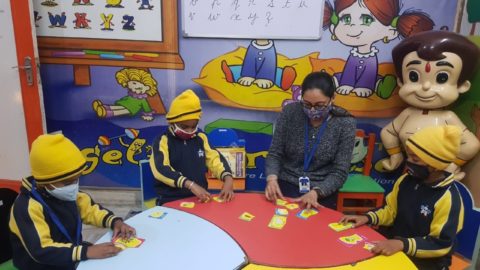# Point 1 = Prepare well ahead!
Some students boast of their skills in hitting the target in the nick of time. Some may feign or actually master the skills but nothing to boast about 11th-hour preparation!
Planning well ahead tops the list of good habits for students. Cannot but avoid being strict parents in such cases when it is in the best interests of our children.

# Point 2 = Chalking out timetables never goes out of fashion
Let the timetable include a routine that will cover the exam syllabus comfortably giving enough time for revision and all other activities. This will bring clarity, focus, and a sense of direction that will increase the self-confidence in children and bring out the best in them.
It works best when timetables are prepared with full participation and involvement from the child. It’s important to keep the timetable realistic and based entirely on the child’s abilities.
# Point 3 = Strong families build a positive environment
Strong families have the backs of their children. Exam times are crucial. Supportive families don’t thrust their personal ambitions on their children.
They employ a parenting style that combines warmth, realistic demands, and democracy. They avoid needless comparisons and allow children to have the space to know themselves and develop their own identity.
They set examples by practicing what they say.
# Point 4 = Practice stress-busting exercises
Stress-busting exercises like running, jogging, a gym workout, cycling, swimming, a favorite sport, boost energy levels, relieve stress, and clear the mind. Parents and children shouldn’t skip their exercise routines during exam time.
Practice pranayama (simple breathing exercises), yoga, especially the Sun Salutation, and meditation.
# Point 5 = A healthy diet to tame the exam stress
A well-balanced vegetarian diet supplemented with fruit juice, nuts, soya milk, and ample water keeps the body and mind in full swing. Avoid junk food, energy drinks, cola, sweets, and chocolates.
Food items with high-fat, sugar, and caffeine content make us hyperactive, more irritable, and moody.
To keep our minds fully alert, we should keep our stomachs light.
# Point 6 = Sound sleep is a stress reliever
Sound sleep relieves stress, improves thinking, and boosts mental focus. Children, youngsters, and middle-aged people should get 7 to 8 hours of sound sleep.
Relieve stress at bedtime to sleep better. Parents should build a good sleep environment with dim light and no noise.
Meditation and deep breathing help relieve stress and sleep better. Bonding with loving pets is an amazing stress-buster.
Note again that panicky last-minute study will harm more. Hence, encourage children to sleep well.
# Point 7 = Ultra-effective study habits
Here are some effective strategies to study smarter, not harder.
- Help your child make written/ voice notes.
- You can use flashcards. Quiz apps are also effective.
- Some children love to study with their family.
- Apply mnemonic strategies.
- Effective reading skills (like highlighting/ underlining) help a lot.
# Point 8 = Discuss exam nerves
A little bit of stress is cool, particularly during exam time. Stress is a part of life. A realistic approach to life is a part of positive parenting. Parents should discuss exam nerves with children. Why not share old wisdom with our children, things like ‘Dadiji ke nuskhe’!
# Point 9 = Reward with treats
Little treats to celebrate little achievements unleash innocent joy. The feel good moment can go a long way making exams less unpalatable.
Reward children with their favourite meals or TV shows when they finish revision. End-of-exams treat is also a cool idea.
# Point 10 = Regular yoga and meditation
Regular practice of yoga and meditation will help children to face exams with more confidence. Confident students make room for more relaxed parents and vice versa.









